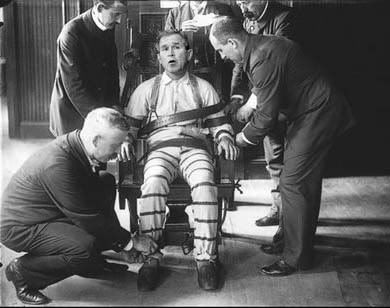
from Time Magazine: THE LONG WAIT
One spring night in 1937, soon after Isidore Zimmerman of New York City had received a scholarship to attend Columbia University, his mother told him that the police wanted to talk to him. He reported to the local precinct and then quickly found himself in jail. One year later, Zimmerman and four other youths were sentenced to death for the first-degree murder of a police detective.
All along, Zimmerman insisted that he was innocent. Then just two hours before Zimmerman was to be executed in Sing Sing's electric chair, Governor Herbert Lehman commuted his death sentence. Zimmerman went on to become a celebrated jailhouse lawyer, and in 1962, after New York State's highest court ruled that he had been the victim of perjured testimony, he was set free. Total time served: nearly 25 years.
Since the prosecutor had known that the testimony was false, Zimmerman believed that New York should compensate him for wrongful imprisonment. The doctrine of sovereign immunity bars most such suits against a state, so Zimmerman pressed the New York legislature to pass a special law allowing him to sue. Three times the legislators voted the bill, and three times then Governor Nelson Rockefeller vetoed it. Last week Governor Hugh Carey signed the fourth bill. Lawyers on both sides agree that Zimmerman is likely to win his case. The only question is whether he will be awarded as much as the $10 million he is seeking. Whatever he gets, the money will be welcome to Zimmerman, 63, who now works as a doorman at a Manhattan apartment house.
from Monday, Jan. 23, 1939:
Five Mothers
In day coaches on a train from New York City to Albany last week rode five despairing, middle-aged women put aboard by a noisy, demonstrative crowd of friends. In a parlor car on the same train, rode New York's bald, kindly Governor Herbert Lehman, glad to be unnoticed. At his office in Albany, some hours later, he met them face to face. For five hours Mesdames Fanny Zimmerman, Yetta Friedman, Ellen O'Loughlin, Yetta Chaleff, Mary Guariglia sat before him silent and tearless (by advice of counsel). For five hours he had to face them while lawyers—talking of poverty, slum life, marijuana, liquor—urged him to commute the sentences of the five women's five sons, aged 19 to 27, who were doomed to die January 26 for committing murder in the holdup of a Manhattan gambling house.* When Governor Lehman had heard all, he solemnly shook the mothers' hands, took a last look into their five anxious faces (see cut), promised to ponder his decision.
This gruesome ordeal had its effect. That very day Assemblyman Edgar F. Moran introduced in the Legislature an amendment to New York's Constitution to let the Governor share his most harrowing responsibility, by setting up a Board of Pardons. Today 16 States have Pardon Boards. But in most States, Governors, though they may rely on other officials to make factual investigations and recommendations, must exercise the awful power of pardoning and commuting sentences alone.


























1 comment:
i hate to tell you but george bush wasnt born yet :)))
Post a Comment